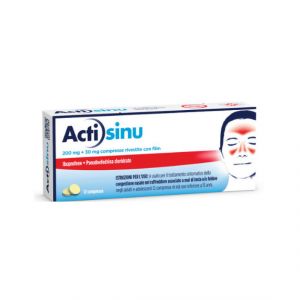Ship in Europe, Find out rates!
Actisinu 200mg Ibuprofen + 30mg Pseudoephedrine 12 Coated Tablets

- box Delivery in Italy in 24/48 and free returns
- star3.000+ positive reviews
- dropboxOver 60,000 products in the catalog
Film-coated tablets with 200 mg Ibuprofen + 30 mg Pseudoephedrine .
Therapeutic indications
Symptomatic treatment of nasal congestion associated with acute rhinosinusitis of suspected viral origin with headache and / or fever. Actisinu is indicated in adults and adolescents aged 15 years and older.
Dosage and posology
Adults and adolescents aged 15 years and over: 1 tablet (equivalent to 200 mg of ibuprofen and 30 mg of pseudoephedrine hydrochloride) every 6 hours as needed. For more intense symptoms, 2 tablets (equivalent to 400 mg of ibuprofen and 60 mg of pseudoephedrine hydrochloride) every 6 hours as needed, up to a maximum total daily dose of 6 tablets (equivalent to 1200 mg of ibuprofen and 180 mg of pseudoephedrine hydrochloride ).
Do not exceed the maximum total daily dose of 6 tablets (equivalent to 1200 mg of ibuprofen and 180 mg of pseudoephedrine hydrochloride). For short term use. In case of worsening of symptoms, the doctor should be consulted. The maximum duration of treatment is 4 days for adults and 3 days for adolescents from 15 years of age. In situations where the symptoms consist mainly of pain / fever or nasal congestion, the administration of products containing a single active ingredient is preferred. Side effects can be reduced by using the lowest dose for the minimum amount of time needed to control symptoms.
Method of administration
For oral use. The tablets should be swallowed whole, not chewed, with plenty of water, preferably with meals.
Overdose
The clinical effects of overdose are more likely due to the pseudoephedrine hydrochloride than the ibuprofen in this medicinal product. Effects are not clearly correlated with dose taken due to inter-individual sensitivity to sympathomimetic properties. Symptoms due to the sympathomimetic effect CNS depression: eg. sedation, apnea, cyanosis, coma CNS stimulation (more likely in children): eg. insomnia, hallucinations, convulsions, tremor In addition to the symptoms already mentioned as side effects, the following symptoms may occur: hypertensive crisis, heart arrhythmias, muscle weakness and stiffness, euphoria, excitement, thirst, chest pain, dizziness, tinnitus, ataxia, blurred vision , hypotension Symptoms related to ibuprofen (in addition to the gastrointestinal and neurological symptoms already mentioned as undesirable effects) Somnolence, nystagmus, tinnitus, hypotension, metabolic acidosis, loss of consciousness Therapeutic measures No specific antidote is available. If the patient presents within one hour of ingesting a potentially toxic amount, administration of activated charcoal may be considered. Check electrolytes and perform an ECG. In the event of cardiovascular instability and / or symptomatic electrolyte imbalance, symptomatic treatment should be initiated.
Contraindications
- Hypersensitivity to ibuprofen, pseudoephedrine hydrochloride or to any of the excipients
- Patients under 15 years of age
- Women in the third trimester of pregnancy
- Breastfeeding mothers
- Patients who have previously shown hypersensitivity reactions (eg bronchospasm, asthma, rhinitis, angioedema or urticaria) following the use of acetylsalicylic acid or other non-steroidal anti-inflammatory drugs (NSAIDs);
- History of gastrointestinal bleeding or perforation related to previous NSAID therapy;
- Active episodes or history of recurrent peptic ulcer / bleeding (two or more distinct episodes of proven ulceration or bleeding);
- Cerebrovascular or other bleeding;
- Unexplained hematopoietic abnormalities;
- Severe hepatic insufficiency;
- Severe renal insufficiency;
- Severe heart failure;
- Severe cardiovascular disorders, coronary artery disease (heart disease, hypertension, angina pectoris), tachycardia, hyperthyroidism, diabetes, pheochromocytoma;
- History of stroke or presence of risk factors for stroke (due to α – sympathomimetic activity of pseudoephedrine hydrochloride);
- Closed-angle glaucoma risk;
- Risk of urinary retention related to urethroprostatic disorders;
- History of myocardial infarction;
- History of seizures
- Systemic lupus erythematosus;
- Concomitant use of other vasoconstrictive agents used as nasal decongestants, administered both orally and nasally (eg phenylpropanolamine, phenylephrine and ephedrine), and methylphenidate;
- Concomitant use of non-selective monoamine oxidase inhibitors (MAOIs) (iproniazid) or use of monoamine oxidase inhibitors within the last two weeks.
Side effects
The most commonly observed adverse reactions related to ibuprofen are gastrointestinal in nature. Peptic ulcers, GI perforation or bleeding, possibly fatal, may occur, particularly in the elderly. Nausea, vomiting, diarrhea, flatulence, constipation, dyspepsia, abdominal pain, melaena, haematemesis, ulcerative stomatitis, exacerbation of colitis and Crohn's disease have been reported following administration. Gastritis was observed less frequently. In general, the risk of developing adverse reactions (particularly the risk of developing serious gastrointestinal complications) increases with increasing dose and duration of treatment. Hypersensitivity reactions have been reported following treatment with ibuprofen, which could consist of: (a) Nonspecific allergic reaction and anaphylaxis (b) Respiratory tract reactivity including asthma, aggravated asthma, bronchospasm or dyspnoea (c) Various skin disorders, including various types of eruptions, itching, urticaria, purpura, angioedema and, more rarely, exfoliative and bullous dermatoses (including epidermal necrolysis and erythema multiforme) In patients with pre-existing autoimmune disorders (such as systemic lupus erythematosus, mixed connective tissue disease), Single cases of aseptic meningitis symptoms such as neck stiffness, headache, nausea, vomiting, fever or disorientation have been observed during treatment with ibuprofen. Edema, hypertension and heart failure have been reported in association with NSAID treatment. Clinical studies suggest that the use of ibuprofen, particularly at high doses (2400 mg daily) may be associated with a slightly increased risk of arterial thrombotic events (e.g., myocardial infarction or stroke). The following list of adverse reactions refers to those seen with ibuprofen and pseudoephedrine hydrochloride at doses contained in short-term over-the-counter medications. In the treatment of chronic conditions, under long-term treatment, further adverse reactions may occur. Patients should be advised to stop taking ACTISINU immediately and consult a physician if a serious adverse drug reaction occurs.
Pregnancy and breastfeeding
- Pregnancy
Pseudoephedrine hydrochloride : Animal studies have shown reproductive toxicity. The use of pseudoephedrine hydrochloride reduces maternal uterine blood flow, but clinical data are insufficient regarding the effects on pregnancy.
Ibuprofen : Inhibition of prostaglandin synthesis could adversely affect pregnancy and / or embryo-fetal development. Data from epidemiological studies suggest an increased risk of spontaneous abortion and cardiac malformation and gastroschisis after the use of prostaglandin synthesis inhibitors in early pregnancy. The risk is believed to increase with dose and duration of therapy. Administration of a prostaglandin synthesis inhibitor has been shown to increase pre- and post-implantation loss and embryo-fetal lethality in animals. Furthermore, the increased incidence of various malformations, including cardiovascular malformations, has been reported in animals given a prostaglandin synthesis inhibitor during the period of organogenesis. During the first and second trimester of pregnancy, ibuprofen should not be administered unless strictly necessary. If ibuprofen is used by a woman attempting to conceive, or during the first and second trimester of pregnancy, the dose and duration of treatment should be kept as low as possible. During the third trimester of pregnancy, all prostaglandin synthesis inhibitors could expose the fetus to: cardiopulmonary toxicity (with premature closure of the arterial duct and pulmonary hypertension); renal dysfunction, which could lead to renal failure with oligohydroamnios; the mother and the child, at the end of pregnancy, to: possible prolongation of the bleeding time, an anti-aggregating effect that could occur even at very low doses; inhibition of uterine contractions resulting in delayed or prolonged labor. Consequently, the use of this medicinal product is: contraindicated during the third trimester of pregnancy and should only be given if clearly needed during the first and second trimester.
- Feeding time
The measures to be taken during breastfeeding result from the presence of pseudoephedrine hydrochloride in the formulation of the medicinal product: pseudoephedrine hydrochloride is excreted in breast milk. Considering the potential cardiovascular and neurological effects of vasoconstrictors, ingestion of this medicinal product is contraindicated during breastfeeding.
Special warnings
Avoid concomitant use of Actisinu with other NSAIDs, including selective cyclooxygenase (COX) –2 inhibitors. Side effects can be reduced by using the lowest effective dose for the minimum amount of time needed to control symptoms. If symptoms persist beyond the maximum recommended treatment duration with this medicine (4 days for adults and 3 days for adolescents), the measures to be taken should be reassessed, in particular the possible usefulness of an antibiotic treatment. Acute rhinosinusitis of suspected viral origin is defined as a series of bilateral rhinological symptoms of moderate intensity, dominated by nasal congestion with serous or purulent rhinorrhea, occurring in an epidemic context. The purulent appearance of rhinorrhea is common and does not consistently correspond to bacterial superinfection. Sinus pains, during the first days of the disease, are associated with congestion of the sinus mucosa (acute congestive rhinosinusitis) and very often resolve spontaneously. In case of acute bacterial sinusitis, antibiotic therapy is justified.
Special warnings related to pseudoephedrine hydrochloride:
Strictly adhere to the dosage, the maximum recommended duration of treatment (4 days for adults and 3 days for adolescents) and contraindications
Patients should be advised that treatment should be discontinued if hypertension, tachycardia, palpitations, cardiac arrhythmias, nausea or other neurological signs such as the onset or worsening of headache occur.
- Before using this medicine, patients should consult their doctor in case of:
Hypertension, heart disease, hyperthyroidism, psychosis or diabetes.
Concomitant administration of anti-migraine drugs, mainly ergot alkaloid vasoconstrictors (due to the α – sympathomimetic activity of pseudoephedrine).
Mixed connective tissue disease - increased risk of aseptic meningitis
Neurological symptoms such as seizures, hallucinations, behavioral disturbances, agitation and insomnia have been described following systemic administration of vasoconstrictors, mainly during febrile episodes or in case of overdose. These symptoms were more commonly reported in the pediatric population.
- As a result, it is advisable:
avoid administration of Actisinu in combination with medicinal products capable of lowering the seizure threshold, such as terpene derivatives, clobutinol, atropine-like substances and local anesthetics, or in the presence of a history of seizures;
strictly adhere to the recommended dosage in all cases and inform patients about the risks of overdose if Actisinu is taken concomitantly with other vasoconstrictor-containing medicines. Patients with urethroprostatic disorders are more prone to developing symptoms such as dysuria or urinary retention. Elderly patients may be more sensitive to central nervous system (CNS) effects.
- Precautions for use related to pseudoephedrine hydrochloride:
In patients undergoing scheduled surgery where volatile halogenated anesthetics will be used, it is preferable to discontinue Actisinu treatment several days before surgery due to the risk of acute hypertension. Athletes should be advised that treatment with pseudoephedrine hydrochloride may result in positive doping tests.
Interference with serological tests: pseudoephedrine may reduce the uptake of iobenguane i-131 in neuroendocrine tumors, thus interfering with scintigraphy.
Special warnings related to ibuprofen:
Bronchospasm may occur in patients suffering from bronchial asthma or allergic diseases or with a history of such conditions. Asthma patients should only take this medicine after consulting their doctor. Patients presenting with asthma associated with chronic rhinitis, chronic sinusitis and / or nasal polyposis have an increased risk of allergic reactions when taking acetylsalicylic acid and / or NSAIDs. Administration of Actisinu could cause an acute asthma attack, particularly in some patients who are allergic to acetylsalicylic acid or an NSAID. Prolonged use of any type of pain reliever for headache can make it worse. If this situation occurs or is suspected, consult a doctor and discontinue treatment. The diagnosis of Medication Overuse Headache (MOH) should be suspected in patients who have frequent or daily headache attacks despite (or because of) regular use of headache medications. Patients with bleeding defects should consult their doctor before using this medicine.
- Gastrointestinal Effects:
The possibility of gastrointestinal bleeding, ulceration or perforation, even fatal, has been reported with all NSAIDs at any time during treatment, with or without warning symptoms or a previous history of gastrointestinal events. The risk of gastrointestinal bleeding, ulceration or perforation, even fatal, is greater with increasing NSAID doses, in patients with a history of ulcer, particularly if complicated with bleeding or perforation, and in the elderly. Such patients should begin treatment at the lowest available dose. Consider combination therapy with protective agents (e.g. misoprostol or proton pump inhibitors) for these patients and also for patients concomitantly taking low-dose acetylsalicylic acid or other medicinal products that tend to increase gastrointestinal risk. Patients with a history of gastrointestinal toxicity, mainly elderly patients, should report any unusual abdominal symptoms (mainly gastrointestinal bleeding), particularly in the early stages of treatment.
Particular caution is advised in patients receiving concomitant medications that may increase the risk of ulceration or bleeding, such as oral corticosteroids, anticoagulants such as warfarin, selective serotonin reuptake inhibitors (SSRIs) or antiplatelet agents such as acetylsalicylic acid. Discontinue treatment with Actisinu immediately in case of gastrointestinal bleeding or ulceration. NSAIDs should be given with care to patients with a history of gastrointestinal disease (ulcerative colitis, Crohn's disease) as this condition may be aggravated. Through concomitant alcohol consumption, undesirable effects related to the active substance, particularly those affecting the gastrointestinal tract or the central nervous system, could increase in case of NSAID use.
- Cardiovascular and cerebrovascular effects:
Due to the presence of pseudoephedrine hydrochloride, the following conditions are contraindicated: severe cardiovascular disorders, coronary artery disease (heart disease, hypertension, angina pectoris), tachycardia, hyperthyroidism, diabetes, pheochromocytoma, history of stroke or the presence of risk factors for stroke , history of myocardial infarction. Clinical studies suggest that the use of ibuprofen, especially at high doses (2400 mg / day) may be associated with a modest increased risk of arterial thrombotic events (e.g. myocardial infarction or stroke). Overall, epidemiological studies do not suggest that low dose ibuprofen (≤ 1200 mg / day) is associated with an increased risk of arterial thrombotic events. Patients with uncontrolled hypertension, congestive heart failure (NYHA II – III), established ischemic heart disease, peripheral arterial disease and / or cerebrovascular disease should only be treated with ibuprofen after careful consideration and high doses (2400 mg per day) should be avoided. Careful consideration should be exercised before initiating long-term treatment of patients with risk factors for cardiovascular events (e.g. hypertension, hyperlipidaemia, diabetes mellitus, smoking), especially if high doses of ibuprofen (2400 mg per day) are required. Skin reactions: Serious skin reactions, some of them fatal, including exfoliative dermatitis, Stevens – Johnson syndrome and toxic epidermal necrolysis, have been reported very rarely in association with the use of NSAIDs. Patients appear to be at increased risk of such reactions early in therapy: the onset of the reaction occurs in most cases within the first month of treatment. ACTISINU must be suspended at the first appearance of skin rashes, mucosal lesions or any other possible sign of hypersensitivity.
- Precautions for use related to ibuprofen:
Elderly patients: the pharmacokinetics of ibuprofen are not affected by age; therefore no dose adjustment is necessary in the elderly. However, elderly patients should be monitored closely as they have a higher frequency of NSAID-related undesirable effects, particularly gastrointestinal bleeding and perforation, possibly fatal. Special attention and special monitoring is required when administering ibuprofen to patients with a history of gastrointestinal disease (such as peptic ulcer, hiatal hernia or gastrointestinal bleeding). In the initial stages of treatment, careful monitoring of urine output and renal function is required in patients with heart failure, in patients with chronic renal or hepatic impairment, in patients taking diuretics, in hypovolaemic patients after major surgery and, in particular, in elderly patients. There is a risk of kidney damage in dehydrated adolescents.
- If visual disturbances occur during treatment, perform a complete ophthalmological examination.
Expiration and retention
Do not store above 30 ° C.
Composition
Each film-coated tablet contains:
Active principles
200 mg of ibuprofen and 30 mg of pseudoephedrine hydrochloride.
Excipients
Tablet core Microcrystalline cellulose Calcium hydrogen phosphate anhydrous Croscarmellose sodium Corn starch Silica colloidal anhydrous Magnesium stearate Tablet coating Hypromellose Macrogol 400 Talc Titanium dioxide (E171) Iron oxide yellow (E172).

